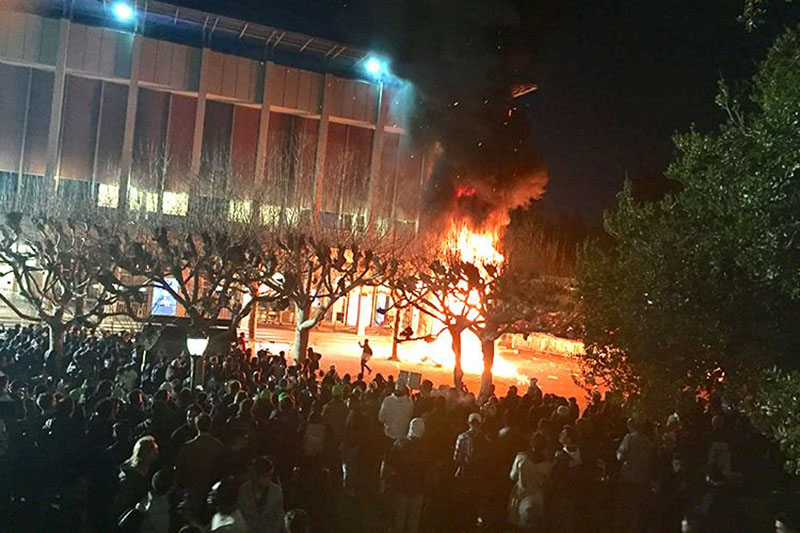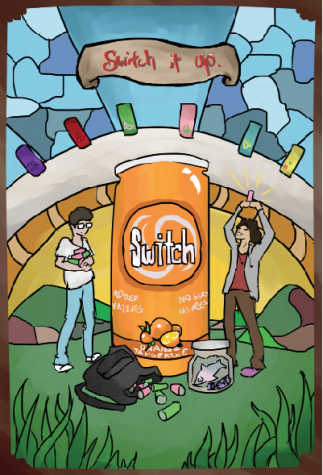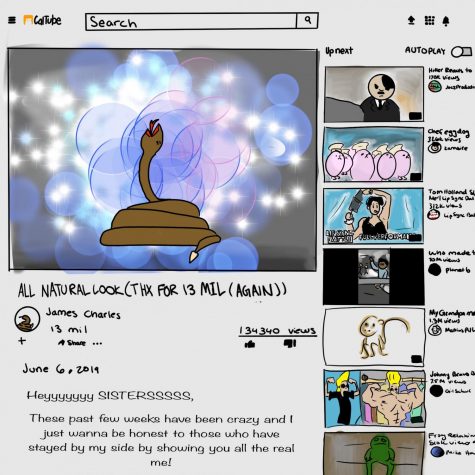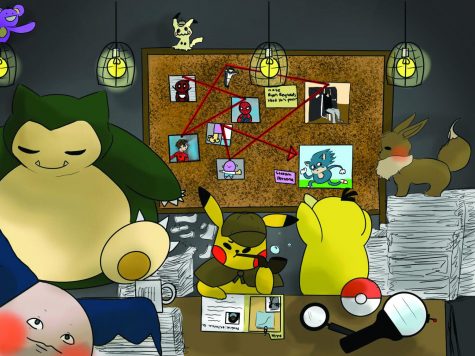Staff speaks out about UC Berkeley protests
UC Berkeley protests turn violent.
The events that took place at UC Berkeley Wednesday night were simply embarrassing. The violence and hate exhibited by rioters on campus was repulsive and cannot be tolerated. I will never support speaker Milo Yiannopoulos and his oppressive political views, but I will always support the right that he and every other American has to free speech. The rioters that stole that right from Yiannopoulos are becoming their own worst enemy.
That being said, President Donald Trump’s response to the incident was immature and nearsighted. His threat to cut federal funding to the university would hurt over 38,000 students currently enrolled. Only a few hundred people were even involved in the riot, and it’s not know if any were even students.
Furthermore, props to UC Berkeley for hosting Yiannopoulos, an editor for Breitbart News, in the first place. The college itself deserves respect for hosting an alt-right speaker on a campus that largely leans liberal during a very divisive time. UC Berkeley and the tens of thousands of respectful, hardworking students in attendance should not be blamed for the disgusting actions of the few.
- Josh Iversen, Managing Editor
UC Berkeley took a hit on Wednesday night when protests over speaker Milo Yiannopoulos turned violent. Reports from Berkeley students and alumni indicate that the 100 protesters dressed in black that ultimately created the violent chaos were not students from Berkeley and did not accurately reflect the night’s initially peaceful protests. Even so, damage to Berkeley’s reputation was done.
To those condemning Berkeley’s violation of free speech: I agree. The First Amendment does not make an exception to “hate speech,” contrary to many claims. So Yiannopoulos had the right to speak to a group of willing Republicans who scheduled his appearance that night.
I am on Berkeley’s side, however. Just as Yiannopoulos had the right to speak, students had the right to protest. Unfortunately, the right to protest becomes vague when violence is involved, and the protesting students’ message was ultimately drowned by violence.
But we have to ask: What made these students protest in the first place?
Yiannopoulos has been known for perpetuating hate against many groups of people. Students had expressed concern over Yiannopoulos’ presence on campus due to fear over Yiannopoulos attacking them and what Yiannopoulos advocates for. As said, Yiannopoulos had the right to speak, but the students’ concerns were valid.
Yiannopoulos has attempted his speeches in other University of California campuses (UC Davis had to cancel his speech because of nonviolent protests as well), and UC Berkeley is one of the most liberal of the UCs. Protests were inevitable, and a line has to be drawn somewhere.
I am not advocating for violence. Violence will never help move us forward to a more peaceful and just nation. The violence at Berkeley did not help those who protest President Donald Trump and march for civil rights. It only helped the other side. But it does drag attention to a more pressing issue: To what extent does free speech and the right to protest protect us? When we use our right and protest a speaker, and the speaker cancels, did we impede free speech?
I don’t advocate for violence, but I advocate for Berkeley’s initial peaceful protests and their gracious apology and remorse after. If I was a student at Berkeley, and Yiannopoulos came again, I would be at the front line at a protest.
- Kat LeTran, Features editor
The events in Berkeley on Wednesday night provide a perfect example of the isolation of the political parties. With tensions high due to the recent travel bans in place and the large number of President Donald Trump’s executive orders, protests have become the norm.
Protests are meant to force perspective upon those in power, to make them see your side of the issue. Protests work, but if they escalate into full blown riots they destroy the lines of communication necessary for democracy.
The last year in American politics has widened the rift between the Democratic and Republican parties, and it will continue to widen if violence is used as the tool to communicate. By making generalizations about the members of each party, for example “violent liberals” or “racist conservatives,” we begin to see our political opponents as the enemy rather than a man or woman with whom we could work.
Milo Yiannopoulos may have opinions that I don’t agree with. He most definitely won’t agree with mine. But wouldn’t it make more sense for me to sit down and have a discussion with him rather than use violence to scare him away.
Whether some people like it or not, Donald Trump is the president, and to protest unfair decisions or actions is not just a right, but an obligation for some.
But to reject any and all legislation he proposes will just lead to a crippled government like we saw during the government shutdown in Obama’s presidency.
Moving forward, Americans should include supporting issues that are bipartisan as well as rejecting those believed to be unfair.
So the real question is this: Are we as a nation going to continue this behavior, or will we learn from our mistakes and build rather than destroy?
- Cameron Harris, News Lite editor
Many people don’t seem to realize it, but many reports and video have shown that the protest at UC Berkeley on Wednesday night was peaceful, at least it started out that way. CBS reported that a large group of masked individuals dressed in black arrived armed with metal rods, and began the rioting. Who were these people? No one is sure, but this detail is paramount with the narrative of showing it was not the college students who escalated the situation into violence. It was these bozos, and it is unknown what political background these people have..
But this is good time to discuss protesting, and when violence is the answer. I’ll be using a notorious alt-right leader Richard Spencer as an example. As much as I want to see the Nazi get punched, you shouldn’t punch the Nazi, unless in self defense. Because when you strike first, you not only victimize the nazi, but delegitimize your cause. Let the Nazi talk. Let him let everyone know what he thinks. Once he’s done talking, you come in, and break down every single one of his talking points, showing how his ideas and philosophy are not only toxic and wrong, but just plain silly.
Let Milo talk. Then we will all know what he truly thinks, and let him see how the realm of ideas treat him. This is how you defeat your enemies philosophically, not by destroying a Starbucks.
- Kiley Borba, Staff Writer




